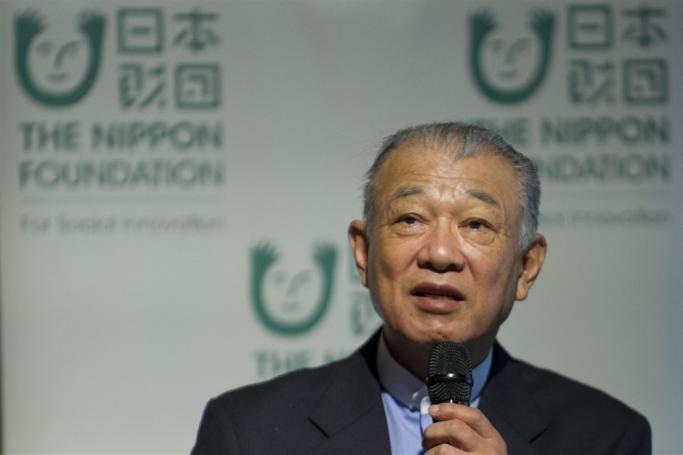Civil society organisation (CSO) Progressive Voice has issued a statement reminding other countries not to forge ties with the Myanmar junta.
It says that the only way to forge real ties with the Myanmar people and its government, is through the National Unity Government, ethnic revolutionary organisations and civil society groups.
Amongst those singled out for criticism are longtime friend of the Myanmar military and Japanese Special Envoy to Myanmar, Yohei Sasakawa, who has been in the headlines again, as his outfit, the Nippon Foundation, took credit for brokering the recent ceasefire agreed between the Arakan Army (AA) and the Myanmar military junta.
The Nippon Foundation was set up by Yohei Sasakawa’s father, Ryoichi, who was deemed a Class A War Criminal for his exploits during World War II.
Yohei Sasakawa had close ties with previous dictator, Than Shwe, enjoying hours-long dinner parties with him.
While lauded for brokering ceasefires and playing a behind-the scenes role among ethnic armed organizations, his involvement in Myanmar’s affairs has never contributed to meaningful change. Rather, they have served to appease the Myanmar military and to stymie opposition.
Another Japanese diplomatic effort is revealing about Japan’s priorities – commercial interests.
A former lawmaker for Japan’s ruling, Liberal Democratic Party, Hideo Watanabe, met with the military’s proxy party – the Union Solidarity and Development Party (USDP) – new Chair, Khin Yi, as well as one of the junta leaders, Soe Win in the past few weeks. Crucially, Watanabe heads the Japan-Myanmar Friendship Association, which seeks to exploit business opportunities in the country, despite the damage the military is doing.
Progressive Voice contrasts these actions with those of the Japanese filmmaker, Toru Kubota, who was illegally imprisoned for three and a half months on trumped-up charges by the junta after attending and filming an anti-junta demonstration.
Upon his recent release he urged the Japanese Government to do more, and to “take a strong proactive approach to human rights violations in Myanmar and also to more proactively criticize Myanmar for that.”
He also reminded Japan of its close economic ties with Myanmar, and the need “to scrutinize very strictly whether such funds are being used by the military and are essentially being used to kill people.”
Kubota has seen and experienced first-hand the terrible violence the junta is inflicting upon the country, and his rebuttal of Japan’s softly-softly approach is telling, says Progressive Voice.
The Progressive Voice statement also criticises the Chinese.
It says that a series of diplomatic engagements have also occurred with various Chinese dignitaries. These include the political consul at the Chinese Embassy visiting the USDP-head, Khin Yi, while the Chinese ambassador to Myanmar met with junta officials, Yar Pyae, and Ko Ko Hlaing, donating money for Myanmar’s peace process.
What Myanmar’s peace process does not need is money. It needs the junta to stop committing war crimes and crimes against humanity against the people of Myanmar. This includes ending airstrikes which are killing, maiming, and displacing whole communities, such as the airstrikes that were launched in Karen State or the bombs that were dropped on schools and monasteries in Sagaing and Magwe Regions, both in the past week.
Incredulously, rather than urging the junta to stop these atrocities, China has sold the Myanmar military six fighter jets which it will surely use to cause more death and destruction for Myanmar people.
Progressive Voice also says that China is not the only neighbor that prioritizes profit over the tragic violence and killings.
It points out that On the heels of the Sasakawa-brokered ceasefire, outlined above, the Indian consul met with the Junta’s Rakhine Chief Minister to finalise the Kaladan Multi-Modal Transit Transport Project.
This comes after the Indian Foreign Minister visited Naypyidaw earlier in November to meet with Min Aung Hlaing, urging the revival of this major infrastructure and transport corridor project. In return India has offered to support Min Aung Hlaing’s planned farce ‘elections ’which the junta does not have the legitimacy to conduct.
Closer ties between India and the junta are not lost on Myanmar’s resistance forces. A people’s defence force (PDF) attack on a junta convoy from India, allegedly transporting weapons, was launched on the weekend of 26-27 November.
Another of the junta’s allies is Russia, which is engaged in its own slaughter of civilians in Ukraine.
The Myanmar military has long been a major buyer of Russian arms and military equipment, and this has increased since the coup attempt – the two countries seeing eye-to-eye on the acceptability of committing atrocities and putting a whole country into crisis.
Most recently, these ties have extended to pledging cooperation on the building of nuclear power plants while a Russian military delegation also met with Min Aung Hlaing at the end of November, agreeing to more cooperation on ‘anti-terrorism.’
The junta is continuously trying to succeed with its ’illegal and brutal attempt to grab power through deepening military, commercial, economic, and diplomatic ties with powerful regional neighbors, according to Progressive Voice. It believes that these countries are backing the wrong horse.
It says that not only is it morally reprehensible to lend any type of support to the junta, but the military does not have control of large swathes of the country, is destroying the economy, losing on the battlefield, and facing increased defections from a demoralized military.
The Myanmar people will not forget who its friends are when the revolution succeeds, and who supported their fight for a federal democratic future.
According to Progressive Voice this is of course, not limited to states, and perhaps this shows more than ever who are the allies in this fight. It is not businesses, states, or multilateral institutions, all of which have been ineffective at taking concrete actions or worse, supporting the illegal junta, but the people-to-people solidarity, such as that shown by filmmaker Kubota, that provide the moral, political, and material support for Myanmar’s Spring Revolution.












